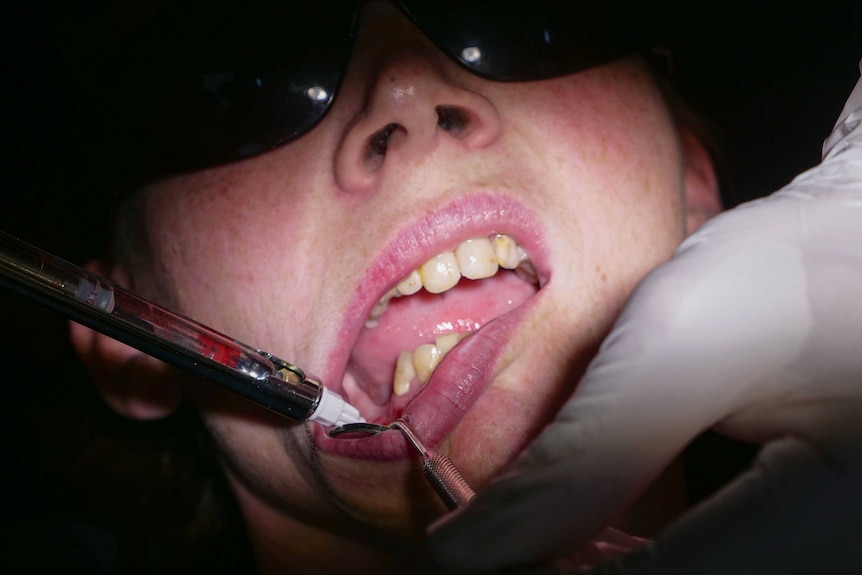The fluoride poll passed the Port Macquarie-Hastings Council even though it did not have the power to act on a “yes” vote
A council on the central north coast of New South Wales has voted to conduct a community survey on the removal of fluoride from public water supplies.
Important points:
- Voters in the Port Macquarie-Hastings local council elections in September will be asked if they want the council to stop adding fluoride to public water supplies
- In 1991, 71 percent of voters said they didn’t want to add fluoride to the water, and the mayor now wants to know if people feel the same way
- The council has been adding fluoride to water since 2012 in accordance with the law on fluoridation of public water supplies
The question: “Would you prefer the Council to stop adding fluoride to public water supplies?” will be presented to the electorate at the same time as the local elections in September.
Port Macquarie-Hastings Council Mayor Peta Pinson used last month’s council meeting to come up with the idea of going to the community.
Last night four councilors voted for the question and three against.
Councilor Pinson said it was not a survey to remove fluoridation.
“It’s just a community poll; it’s a broad engagement process so we can see how our community is feeling in 2020,” she said.
The Port Macquarie-Hastings Council has been adding fluoride to water since February 2012 in accordance with the Fluoridation of Public Water Supplies Act and the NSW Code of Practice for Fluoridation of Public Water Supplies.
No legal authority
Councilor Peter Alley, who voted against the proposed poll, said the council had no power to stop fluoridating the water supply.
“Under NSW’s Fluoridation Act, we are forced to continue fluoridating the water supply,” he said.
“We don’t have the legal authority to stop.”
“What we’re going to measure in a poll is the number of people we’re going to disappoint.
“The people who are going to vote they don’t want fluoride in the water supply will expect the council to act and we cannot respond to that.”
Over the past year, the council sought and received legal advice on the legality of adding fluoride to the local government area water supplies.
A council report found that adding fluoride to water network systems had been illegal since the Medicines Act was introduced in 1989.
A 1991 poll found that 71 percent of voters who participated in the poll did not want fluoride added to the water supply, which was accepted by the council.
“Is that the same feeling in 2020?” Councilor Pinson said.
“Fortunately, our community has the option to vote yes or no.”
The one-question poll could cost the council around $ 60,000.
Never done
Around 96 percent of NSW’s population receives fluoridated water, and the public health benefits of fluoridation are recognized by the World Health Organization, major dental associations around the world, and NSW Health.
“Water fluoridation is a safe, legal and ethical way to benefit everyone, especially the disadvantaged, and has been shown to prevent tooth decay at all ages, but it is especially beneficial for children,” said a spokesman for NSW Health.
Only one local water company in the state’s southwest – the Balranald Shire – has ever asked NSW Health to revoke an order to fluoridate a water supply.
However, NSW Health has not revoked the order and the water supply continues to be fluorinated.
The department said that should a similar request be received, NSW Health would consider information from the council and other sources, including other government agencies, dentists and the Advisory Committee on Fluoridation of Public Water Supply.
There are only a handful of communities in NSW where fluoridation is not possible for a variety of reasons, including technical limitations or where supplies are primarily supplied from rainwater tanks on individual homes.
Dentists say fluoride is safe and effective in preventing tooth decay. (
ABC Radio Sydney: Harriet Tatham
)
“Safe and effective”
Port Macquarie dentist Mark Brisley said it was important that the community be well informed and that was a job for the Department of Health and bodies like the Australian Dental Association and Medical Association.
“I want to reassure people that it’s actually very safe,” he said.
“Teeth with fluoride in the enamel are less prone to tooth decay.”
Dr. Brisley said fluoride has been in drinking water in Sydney since the early 1960s and has been in drinking water for longer in the United States.
“People have raised their concerns that it may not be healthy, but the studies, and there have been many studies over the past 50 years, have shown that it is a very safe and effective way to reduce tooth decay,” he said .
“There is a wide range of opinions on everything in the community, and water fluoridation seems to be just one of those problems, along with things like vaccinations and other public health measures.
“We have had water fluoridation for eight years now, and so far it has been shown to be as effective as in other parts of the community.”
Dr. Brisley said it was easy to study the effectiveness of fluoride.
“The nature of water fluoridation is that large populations may or may not be affected by water fluoridation,” he said.
“So fluoridation with water significantly reduces the amount of tooth decay – especially in children – and it is very easy to measure and has been proven to be true all over the world.
“If we didn’t have water fluoridation, we would likely find that tooth decay rates, especially in children, would increase over time.”
The results of a vote are not binding on the newly elected council and participation of voters is voluntary.



Comments are closed.